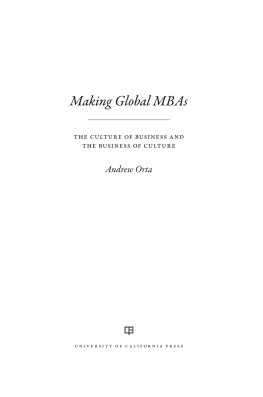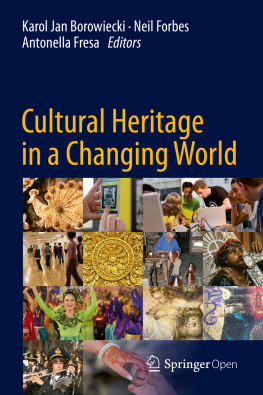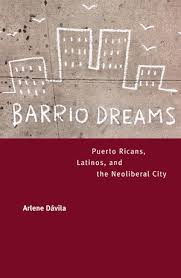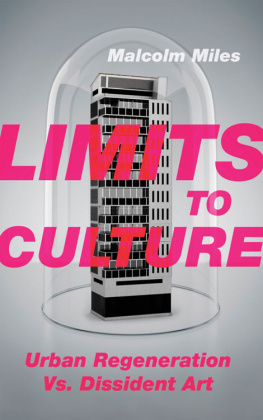Thank you for buying this ebook, published by NYU Press.
Sign up for our e-newsletters to receive information about forthcoming books, special discounts, and more!
Sign Up!
About NYU Press
A publisher of original scholarship since its founding in 1916, New York University Press Produces more than 100 new books each year, with a backlist of 3,000 titles in print. Working across the humanities and social sciences, NYU Press has award-winning lists in sociology, law, cultural and American studies, religion, American history, anthropology, politics, criminology, media and communication, literary studies, and psychology.
Culture Works
Culture Works
Space, Value, and Mobility across the Neoliberal Americas
Arlene Dvila

NEW YORK UNIVERSITY PRESS
New York and London
www.nyupress.org
2012 by New York University
All rights reserved
References to Internet Websites (URLs) were accurate at the time of writing. Neither the author nor New York University Press is responsible for URLs that may have expired or changed since the manuscript was prepared.
Library of Congress Cataloging-in-Publication Data
Dvila, Arlene M.
Culture works : space, value, and mobility across the neoliberal
Americas / Arlene Davila.
p. cm.
Includes bibliographical references and index.
ISBN 978-0-8147-4429-1 (cl : alk. paper) ISBN 978-0-8147-4430-7
(pb : alk. paper) ISBN 978-0-8147-4431-4 (ebook) ISBN
978-0-8147-4432-1 (ebook)
1. Latin America Cultural policy. 2. Latin America Civilization. 3. Arts Americas. 4. Cultural industries Americas. 5. Neoliberalism Americas. 6. Latin Americans Economic conditions. 7. Latin Americans Social conditions. I. Title.
F1408.3.D37 2012
980 dc23
2011043845
New York University Press books are printed on acid-free paper, and their binding materials are chosen for strength and durability. We strive to use environmentally responsible suppliers and materials to the greatest extent possible in publishing our books.
Manufactured in the United States of America
Acknowledgments
The main ideas for this book grew out of my regular graduate seminar on culture and consumption, and I thank the students who have participated in this course throughout the years, especially Johana Londoo and Jan Padios, for the inspiring exchanges that led to the overall conceptualization of this book. Each chapter, however, has its own trajectory and its respective number of collaborators, all of whom deserve my deepest appreciation. Marisol LeBrn, Louis-Philippe Michel Romer, Victor Torres-Vlez, Elizabeth Chin, and Maureen ODougherty provided useful comments to was made possible by the many artisans who welcomed me back to the Puerto Rican folk art circuit after a decades absence. Learning about their trajectory as cultural workers throughout a challenging economic decade was inspiring and enlightening of the love and passion that fuel artisans continued participation in this sector. Finally, thanks are due to my sister Mara de los Angeles Dvila and my niece Diego Gabriel Dvila for their generous hospitality during my stays in Puerto Rico and to my parents, Diego Dvila and Laura Feliciano, for their consistent support throughout the years and for their company while I finished the manuscript during the last month of my teaching leave.
I could not have written . It was also an honor to have had the help of Miguel Luciano, who was a great supporter of the entire book even before his work became central to one of the chapters.
The chapters set in Buenos Aires were foremost assisted by Alejandro Grimson, who was a generous colleague and mentor during my stay there. He introduced me to three very talented research assistants: Laura Benas, Juan Felipe Castao Quintero, and Ana Fabarn, who made my stay more productive and enjoyable than I could have ever imagined. Thanks are also due to Maria Carozzi for her nuanced introduction to the performance and politics of tango dancing, to urban anthropologist Maria Carman for her help and introduction to key scholars working on issues of cultural policy and creative industries, and to Judith Stacey, my tanguera colleague, who read and commented on these chapters. Yet it is to my milonguero friends to whom I am most indebted, especially to the generous and brilliant tanguera Viviana Parra and to the immigration lawyer Christian Rubilar, who shared my interest in the expat community and read and commented on this work. My conceptualization of expats role in the global economy was also assisted by my discussions with Judith Freidenberg and Cotten Seiler, and with my longtime friend, the talented geographer Beverley Mullings, whose work with Jamaican expats provided a helpful comparative perspective. My New York City tanguero friends also offered much help and support, especially Linda and Jim Gucciardo, whose phone kept me connected during my fieldwork. Two travel research awards from NYUs Center for Latin American Studies, supported by grants from the Dean of the Social Sciences, provided travel support.
Colleagues and friends at NYU were also central to this work, especially David Privler and Marty Correia, who assisted with the illustrations and the preparation of the manuscript. Neil Brenner, Fred Myers, Jonathan Rosa, Yarimar Bonilla, Junot Daz, Maritza Stanchich, Daniel Nieves, Marisol LeBrn, Carlos Vazquez, Johana Londoo, and Jan Padios helped me maintain a joyous approach to my scholarship and helped renew my inspiration when I felt I was running out of ideas, especially in simplifying the complexities of my books title. Junot: I simply do not know what I would do without you.
I am lucky to have the wonderful editorial team of New York University Press. Eric Zinner was supportive of this idea since it was a mere outline of chapters; Ciara McLaughlin and Despina Papazoglou Gimbel provided the detailed assistance to turn these pages into a final product. Randy Martin, George Ydice, and a third very knowledgeable anonymous reviewer were invaluable to my elaboration of the larger integrative conceptual themes of this work, and I thank them for their careful reading. Finally, my deepest gratitude goes to Linda Alcoff, Marcela Clavijo, Orlando Gil, and Brenda Alejandro, who provided encouragement and support at different stages of this project with their confidence and unabated faith in my work; and most of all, to all the artists and cultural workers in Puerto Rico, Buenos Aires, and New York who collaborated in this project and are identified by name, and who are the primary motivation for this work. This book is dedicated to all of you, trabajadores de la cultura, for the work you do and the gozo you impart throughout the world.
Introduction
Culture is on the rise. In most contemporary cities, there is not a project or policy without a cultural component, as discussion intensifies over the role culture plays in urban development projects. Tourism and shopping and entertainment based-developments are growing, while cultural workers and creative classes, including architects, entertainers, artists, and opinion makers, are increasingly recognized to be central to the economic vitality of modern cities. In this context, cultural initiatives take center stage, though not all manifestations of culture and creative workers benefit equally from this cultural turn. It is the work that culture is increasingly asked to do in neoliberalism, and the debates that ensue from the reduction and instrumentalization of culture into economic policies, projects, and frameworks, with which this book is concerned.
Next page







